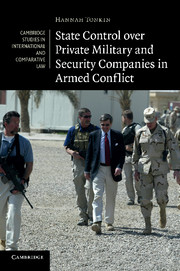Book contents
- Frontmatter
- Contents
- Acknowledgements
- Abbreviations
- Table of cases
- Table of statutes
- Table of international treaties and conventions
- Introduction
- 1 The private security industry uncovered
- 2 State obligations and state responsibility
- 3 The attribution of PMSC conduct to the hiring state
- 4 Obligations of the host state
- 5 Obligations of the hiring state
- 6 Obligations of the home state
- Conclusion
- Bibliography
- Index
- References
Conclusion
Published online by Cambridge University Press: 05 October 2012
- Frontmatter
- Contents
- Acknowledgements
- Abbreviations
- Table of cases
- Table of statutes
- Table of international treaties and conventions
- Introduction
- 1 The private security industry uncovered
- 2 State obligations and state responsibility
- 3 The attribution of PMSC conduct to the hiring state
- 4 Obligations of the host state
- 5 Obligations of the hiring state
- 6 Obligations of the home state
- Conclusion
- Bibliography
- Index
- References
Summary
The extensive use of PMSCs in recent armed conflicts challenges the conventional wisdom that military and security functions are most effectively and appropriately performed through public forces. In practice, this may reduce the ability of states to control violence and to ensure accountability for misconduct in armed conflict. Yet the widespread outsourcing of military and security activities to PMSCs has not entirely undermined the capacity of states to control violence in the international arena, nor has it rendered the traditional state-centred frameworks of international law irrelevant in this context. Certain states retain the capacity to exert significant influence over PMSCs operating in armed conflict, and this enables international law to regulate PMSC activities indirectly using states as an intermediary.
- Type
- Chapter
- Information
- Publisher: Cambridge University PressPrint publication year: 2011

